Issue Number 36, Spring 2017
Contents
- Kaddish in the Anthropocene Era by Leah Korican
- Respiring by Gail Rudd Entrekin
- Animals in the Yard by John P. Kristofco
- Dear Future by Joan Baranow
- Bolinas Lagoon by CB Follett
- One Bird Falling by CB Follett
- The Death of Rachel Carson--April 14, 1964 by Donelle Dreese
- Night Caller by Tiffany Midge
- Spring Valley Reservoir by Tiffany Midge
- Villain by Samantha Grenrock
- Extra by Jennie Neighbors
- Punch Bowl Hike Meditation by Scott Starbuck
- Full-Day Tour of Chernobyl by Vernita Hall
- Oregon by Bonnie Bishop
- The Lumberjack by William Stratton
- Life's Work by Julia Shipley
- Old Game by Karen Neuberg
- Aquarium by Amy Collier
- The Long Tom by Dov Weinman
- What Had Killed Her by Sydney Doyle
Archives: by Issue | by Author Name

Kaddish in the Anthropocene Era
by Leah Korican
Leah lives and creates in Oakland, California, near the Temescal Creek watershed.

Each day with brittle tongue
even in our grief
we praise the bounty of being:
bowing, nodding, eyes closed.
How should I know
what comes after saying Kaddish?
Aren’t we always answering a question
by asking a question?
I always expect flames and plagues.
You know that Ashkenazi,
child-of-Holocaust-children anxiety?
Now 97 percent of scientists agree with me.
I see the neighborhood burning
and the smoke choking the bay,
hanging heavier than fog,
releasing its carbon into the atmosphere.
I read about the moose
dying all over North America,
killed by thousands of itchy ticks.
Terrible way to go.
The moose is not intimidated by bears,
and their size makes everyone feel small
except the ticks, who feel like a moose
is a crowded buffet.
shines dull white;
ghost moose wanders
in the dark woods till it falls.
I could say Kaddish all day for all the creatures
going extinct or threatened or vanishing.
That, along with all those Starbucks,
is a hallmark of our age.
I click links to send petitions
and share the ghost moose story on Facebook
above the cake fail and below the obit
for a famous rocker.
Should I praise the glory of it all?
Feel acceptance and peace?
Or should it be anger
like a prophet in the temple
smashing things, yelling, gesturing,
wailing, crying, tearing clothes?
What is the proper response
to the news of the death of the North American Moose?
We don’t miss the ancient predators.
We exterminated the dire wolf
and sabre tooth tiger.
Would you want one for a neighbor?
Still once the food chain
is tangled and twisted
and broken, it’s going to get ugly:
roast rat, ticks on toast.
What are the proper words
to pray, bows and bends to make
on this day
with this news?
Do we just keep saying
these tuneless words of praise,
this ageless plea for peace,
a question
we can’t help answering
with a question?
© Leah Korican
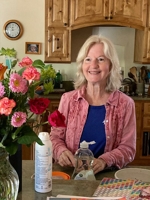
Respiring
by Gail Rudd Entrekin
Gail lives amid the Coastal Range east of San Francisco Bay in the San Pablo Bay watershed just above San Pablo Creek on lands of the Chocheno and Karkin Ohlone people.

The planet moves ponderously, turning me
into the sun my body craves, opens to receive
its heat. I breathe in air that’s passed perhaps
through the lungs of a neighbor’s dog,
the postman, the Vietnamese women at the nail salon
who breathe these atoms in and out. Everyone
who’s ever lived has taken in, used up, exhaled
reconfigured the particles that make this air.
I fill my lungs, take what I breathe into my blood,
sigh out the other parts for the maple tree,
sycamore, rhododendron, who wait
for my rejected molecules, green up, flower
or color or seed, and blow back the parts
I need.
© Gail Rudd Entrekin

Animals in the Yard
by John P. Kristofco
John lives in the Lake Erie watershed, Central Basin, about ten miles east of the mouth of the Cuyahoga River.

as if we were Saint Francis,
we crouch down on one knee to summon them,
think they’ll come for comfort, love,
share some common soul----
in twilight backyard after dinner,
Eden with no tree;
but they stay back, watch
as quiet fills the space,
and we sense it isn’t Disney after all:
they stare as if they’ve seen the films:
Orwell’s, Hitchcock’s,
that business at the beach,
and they move with DNA resentment
for “dominion” and “subdue;”
the breeze grows chill;
we scan the yard, the sky,
arise uneasy as an alley walk at midnight,
and back into the kitchen
where we watch them
from the window in the place
they knew we came from
all along
© John P. Kristofco

Dear Future
Preliminary treatment uses screens or grinders to capture or macerate solids such as wood, Q-tips, and dead alligators so they don’t muck up the works further down the line.
—Dave Praeger
by Joan Baranow
Joan grew up in New England and rural New York in the midst of dairy farms and deciduous woodland. Her arrival in California coincided with several years of heavy rainfall—a sweet welcome to this usually arid climate.

We tried, really. When ooze gooped up the ocean
we invented suction to separate plastic from salt,
but too many dolphins got torn apart in the process
and you know how we felt about dolphins.
After that Congress canceled the Internet
and put the country in reverse.
No one could remember bologna sandwiches
or Simon Says anymore anyway.
The Super Bowl, however, remained
high octane. We hosted parking lot brawls
and instantaneous T-shirts.
Not so Women’s Lib weeping at the seams.
It all depends on what we thought was real.
Sidewalk cracks were avoided.
As were robo-calls. Even the thought
of lab animals patched up for the night.
We could never agree on which death
was best for the country. On whose terms.
Clearly humans had become immune to irony.
We engineered nets to catch the suicides,
then legislated assisting them to death.
Please know these were the good days
before you replaced us. We thought
nothing of trading hearts among species,
injecting toxins to effect a cure, passing
the body through enormous magnets to map
the damaged gut.
It was good times. It was plenty
of packaged beef, bubble wrap, clam shell,
call waiting, deodorant, non-stop flights,
zero prime rate, Safe Zone training, and
antimicrobial copper-alloy surfaces
too slick to stick to, though
measles made a late comeback at Disneyland.
It was easy to get sweet on nature
with a bottle of amoxicillin in the fridge.
We stripped off the lead paint and installed seat belts.
We figured death happened to other people
for the best reasons. The worst, they say,
was picking Q-tips by hand out of
the sewer grates. That was 10% of the job.
The rest was shoveling sludge from city drains.
As I said, despite being a bickering, tormented lot,
we tried. We really did.
© Joan Baranow
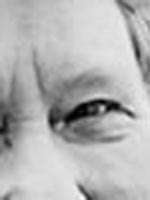
Bolinas Lagoon
by CB Follett
CB lives in the Mt. Tamalpias watershed in Marin County, CA.

Out of marsh grass
seemingly empty
the white shawls
rise into air
and fly.
© CB Follett

One Bird Falling
by CB Follett
CB lives in the Mt. Tamalpias watershed in Marin County, CA.

A bird falls,
spinning in widening circles,
like a spiral losing its tension,
or a pebble dropped in a pond.
The bird is already lost,
some distant shot, or a falcon
pierced then let it slip, and it falls
pulling the sky after it.
Like egg shells collecting again
in a film run backwards.
The waters of the pond reflect its coming.
The waters of the pond open
like a passage and welcome the bird in.
Not a bird now, but a flutter
of loosened feathers, a pirouette
adrift on a pewter eye.
No one can put this bird back together.
No one can uncrack the egg
of this world. The heart
flutters against itself. The bird,
which has fallen into the water
has sunk from sight, the feathers have drifted
and spilled over the distant weir.
The rift closes over itself
and the surface, again, is smooth.
© CB Follett

The Death of Rachel Carson--April 14, 1964
The battle of living things against cancer began so long ago that its origin is lost in time. ~~Rachel Carson
by Donelle Dreese
Donelle lives in the Little Miami River watershed in Cincinnati, Ohio.

It had spread to her liver.
She never read the last letter
from Dorothy, the one that said--
I have come to a great sense of peace about you.
She said for all at last return to the sea.
Then death came whale-bursting
into her life, metastasizing
stirring its cellular gravel.
Denial is a disorderly thief
and resistance turns water to lead
so she let the thing flow through her
plunged her tired arm into the mud
felt the cool, thick mercy
against her skin, waited for the clay pack
to reclaim her fingerprints
until pain became impossible.
© Donelle Dreese

Night Caller
by Tiffany Midge
Tiffany lives in Moscow, Idaho, which lies on the eastern edge of the Palouse region of north central Idaho in the Columbia River Plateau, homelands of the Nimiipuu-- the Nez Perce.

The mollusk inching toward my door,
its body a broad wet muscle of rain and ascent
reminds me how all things are possible,
just as the rain foretells certainty
in a language of unquestionable voice.
I hear the night break, the moon
tossing back her hair. I hear the hum
of contentment shuddering in the grass.
The mollusk seeks direction, drinks
in the door’s pool of light, charts
a course for warmth, its horns
pivots of radar, exclamation points,
exquisite attachments puzzling out the smell
of water and storms. In the last twenty-four hours
there’ve been sloughs of visitors to this porch:
half-drowned spiders, stink bugs, furious horse-flies.
We’ve discarded them tenderly, others
mercifully tended and killed—unnamed shadows,
unmarked graves, wings and songs put to rest,
lunacies of want laid down. You turn in sleep,
then wake and tell me about tropical weddings
and masked brides, guests who only speak
the warbled tongue of sparrows, and fall back again—
dreaming your night stories, hosting the night visits,
each with its own small creature,
each with its own grand light.
First published in Drunken Boat and appears in author’s collection, The Woman Wh0 Married a Bear.
© Tiffany Midge

Spring Valley Reservoir
by Tiffany Midge
Tiffany lives in Moscow, Idaho, which lies on the eastern edge of the Palouse region of north central Idaho in the Columbia River Plateau, homelands of the Nimiipuu-- the Nez Perce.

Some things are necessary, the pheasant
for instance, her call claimed first in the chest,
an elegant not wholly unpleasant
thrum as if a small being has made a nest
below your ribs, then strikes her way out.
Or the heron who wreathes the water
dragging along a veil of mist like white-
lace meteors along the reservoir
banks. We need the osprey, her acrobatic
plummets for bluegill, her aerial craft,
the way we need air, water, light. The creek
runoff pitches into a green prayer mat
of marsh amazed by its own silk body.
We live on this: the wings, the rhapsody.
First published in Yellow Medicine Review and appears in the author’s collection, The Woman Who Married a Bear.
© Tiffany Midge
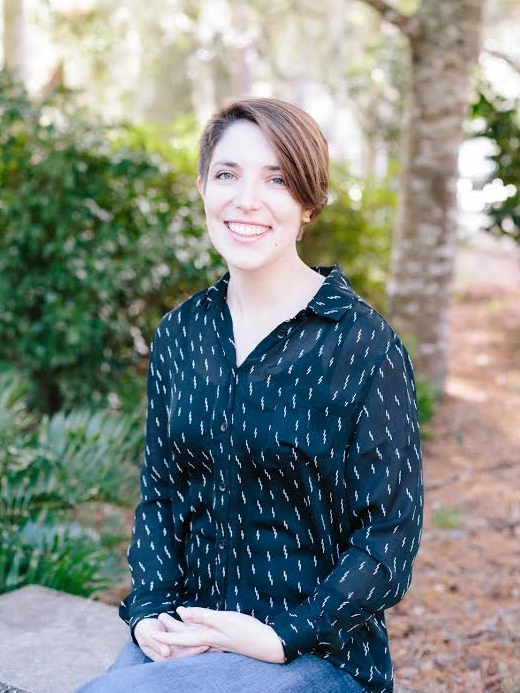
Villain
by Samantha Grenrock
Samantha lives in the Oklawaha watershed near Hogtown Creek and the Cabot-Koppers superfund site. The canopy is all banana spiders and Spanish moss.

Raiding nests for fun, the black and white tegu
is caught on camera, an egg larger than its head
held lightly in its jaws, then carried off
and consumed without pleasure. That third-eyelid lizard look
looks past you. Like so many things on the cusp
of unmanageable, the tegu came by ship
and made a break for it. Descendant of that first escapee
tastes the familiar subtropics with a forked tongue, pink and lolling
in its mug shot, as if to say, there will always be more of us—
necks thick like Godzilla’s, black and white markings
greenish in youth, bad attitude,
no goals. These opportunists.
Here it is again in the coarse pelt of St. Augustine grass,
jumping the fence when the invasion curve says release the trappers
in their day-glow vestments, ready the canvas bag.
© Samantha Grenrock

Extra
after Wendell Berry
by Jennie Neighbors
Jennie lives below the Blue Ridge Mountains in the Saluda River Basin, near where the Reedy River flows through Lake Conestee.

to find consolation where “the great heron feeds” --
as if the great heron feeds on air,
as if without terror
the too-late frog is caught by the keen bill
there is no consolation in wildness;
there is no wildness:
the great heron eats as it must,
and, besides, nothing is untouched,
nothing is beyond us
when we are all gone
and the universe is chemicals and laws without eyes
will it matter that there is no memory?
yet in some nowhere of the centerless expanse
a heart feels weightless
we are each this world,
a production of laws and chance,
so tell me, what is lightheartedness?
do tadpoles swim through crystalline palaces?
do birds glide through expanding air?
somewhere, someone’s heart is light
everything is extra
© Jennie Neighbors

Punch Bowl Hike Meditation
by Scott Starbuck
Scott travels between the north Oregon Coast, Columbia River Gorge, and his teaching job overlooking The Rose Creek Watershed in California.

For 30 years
I’ve talked to myself
about climate change
but now most everyone is.
When you think that long
you feel for
Nina in flower garden,
sparrow on fence.
An earlier draft of this poem appeared in San Diego Reader
© Scott Starbuck

Full-Day Tour of Chernobyl
One of the most radioactively contaminated sites in the world: the 1000 mile Nuclear Power Plant (NPP) Exclusion Zone in Ukraine, around the site of the reactor explosion of April 26, 1986.
“Found poetry” text excerpted, in order, from a tours webpage1.
by Vernita Hall
Vernita is a lifelong Philadelphia native. In her northern neighborhood of old houses and quiet streets, Kwanzan cherry trees, azaleas, and rhododendrons glorify each spring.

Low Price Guarantee!
Explore the Exclusion Zone
You are welcome to spend
maximum time inside
see an open-eye experience
Expect some changes
abandoned houses and barns
an almost fully buried village with
a kindergarten
a Red Forest
The first and worst fall-out:
the town of Pripyat
populated by 50 thousand people
before the evacuation
The fire fighters and NPP workers
badly affected by
a river of consequences
a correction point, ruins of culture
for the Prypyat youth
Ferris wheel in the amusement park
which was never open—
a disaster
After explosion: giant catfish
<Giant secret>
Tour includes radiation
and personal departure
Necessary information
(unlikely to be confirmed):
in case of
eating, drinking, and smoking in open air
touching buildings, trees, plants
eating mushrooms, berries, fruit, and nuts
in forests of the abandoned settlements
sitting on the ground
on persons there is
a 100 percent cancellation
1 “Full-Day Tour of Chernobyl and Prypiat from Kiev,” Viator, 20 Oct. 2016.
© Vernita Hall

Oregon
for Clare
by Bonnie Bishop
Bonnie lives on a 40-acre outcropping of ancient shale and limestone beds, part of the 600 year old Cambrian sedimentary Weymout Formation. This little island in the North Atlantic is connected to the mainland by a mile and a half long tombolo and is famous among geologists for its gabbro.

Down through the twilight we drove,
leaving behind the promontory,
the long view of the misty beach
punctuated by boulders big as hotels,
the lavender horizon and mottled sky,
down through deep green groves
we rode, talking about resurrection,
the kind when people we know have
stepped out of the tomb, blinking,
waving away spider webs, stepped
away from damage and despair
into the green life that seems
to have been waiting for them all along,
when an elk stepped out of the path of our car
into the coniferous, ferny-floored forest
and turned her huge beautiful head toward us
before vanishing.
© Bonnie Bishop
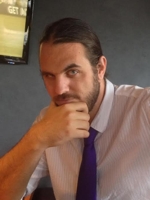
The Lumberjack
by William Stratton
William resides on the shores of Lake Champlain, nestled between the relatively fast-growing Adirondacks and the much more ancient Green Mountains. Hiking up through a few thousand feet of stone, water, ice and snow of those peaks, he can almost make out where the Lamoille River reaches the bay near his home.

I took trees from up on the mountain
for thirty years give or take. The trees
took my youth, my joints, and gave me money.
I couldn't spend it on anything
but the bottle and some brown then my wife
left and I tried putting my life back on
for a while but damned if I hadn't forgot how.
I knew how to fall them just right I almost
never had one hang and I could close my
eyes right before the final cut and feel with
my hands the slow tip of the big body and
know where the mainline was, waiting to
pull the big logs down to landing. I was good.
Not many left now, like there was.
I put the logs down one by one for years but
they got the better end. I might as well
have fallen out there, among friends.
I might as well have felt something snap,
felt the heat of sap on my body felt a hole
in my gut or maybe breaking an arm or leg
the last thing I remember the cold steel
in my side punching right through
maybe I could hear the saw and maybe
I could see one last time that I had
stood on my own and that I was
worth something and that somebody
wanted me to be strong and good
and I would have blotted out the sky
for one long minute as I fell as they
tried to catch me and then only
the earth could stop me hitting
the ground and yeah I pulled logs
out by the hundred over a long while
but at least they died among family.
© William Stratton

Life's Work
by Julia Shipley
Julia lives in northern Vermont, an area very much renovated by glaciers, beside the Black River in the St. Francois watershed, one of only a few in the United States which flows north.

I was nineteen, almost
twenty when the driver
gave his bully bus a break
on the brink of the Great
Outback by an anthill
taller than he, actually,
there were three termite
towers comprised of silica,
saliva and centuries of sustained
intent—a monument
to minute contributions,
and the wheezing driver on the cusp
of his retirement pension granted us
this spectacle, wanted or not,
thus some of us studied this pinnacle
of a civilization while he rolled
his cigarette, and licked it shut.
Smoke break over, Righty-O,
he stubbed his butt and steered
the bus back to the bitumen,
to finish his piecework, his portion
of the multi-stage circuit:
Darwin-Uluru-Melbourne;
twenty years along, I hereby
consecrate my witness to this
glory: how we go, how we come—
syllables accreting via saliva-ed
tongue, day upon day, rising
by the hour—our accruing crumbs.
© Julia Shipley

Old Game
by Karen Neuberg
Karen lives in the Atlantic Ocean/Long Island Sound Watershed in Brooklyn, New York, just a few blocks from the East River.

In yet-to-be hours, the remaining
children play the old game.
Milling around each other,
they jump and lumber, walk on all fours,
leap, roll, sniff, hug, flap arms,
and make assorted noises—
snorts, barks, buzzes, grunts, trumpets,
roars, low- and high-pitched cries—
until one by one, they clutch
themselves and fall.
When all are down, another child
sprinkles each with powder
said to contain ground
horn and tusk, beak and claw,
while reciting in a solemn voice
names memorized by heart:
Whale, bat, bee, tiger, falcon, bobcat,
wildcat, zebra, gray wolf, jaguar, dolphin, giraffe,
manatee, terrapin, ocelot, elephant, gorilla, polar bear,
rhinoceros, hippopotamus, orangutan.
And with each name said,
a child raises an arm.
And this is the old game the children play.
And its name is Sorrow.
© Karen Neuberg

Aquarium
by Amy Collier
Amy was born in the middle of five Great Lakes and now lives on pudding stone that is rising up at a very gradual rate.

Among a school of workers
funneling into the train
commuting to or from
a many windowed building
I think of
age eleven
the Monterey Aquarium.
I see tuna shooting through
a cylindrical display
in a liquid silver ring
above my head
and the plaques tell me
to fish it's all the same.
The bluefin's happiness
is 40 mph. We have
tricked their perception
of place and distance.
© Amy Collier

The Long Tom
by Dov Weinman
Dov lives next to the sea and in the shadow of Mt. Panamao on Biliran Island in the Philippines. Waters from the Badiang River feed the many water falls and terraced rice paddies scattered throughout the rolling hillsides.

I help slide the kayaks into murky current,
feeling more than seeing his excitement
at being able to take me out on the water.
I leave for overseas service soon, and we're
mostly quiet as we point toward red-winged
blackbirds dancing out of the reeds and
spiraling marsh wrens. We slowly move by
cattails and around sunken logs, relics of
an older forest. Listening to bird calls, our
paddles smoothly push our crafts and cause
an egret, dressed in white, to abandon its
patient hunt along the bank. A bald eagle,
enthroned on a wind-twisted snag, looks away
from the warm sun that paints our shoulders.
We leave each other to our own thoughts,
mine drift toward the future, knowing that
this place may disappear, its shady, floating
passages and overgrown banks caught by
the slow progress of a growing city. I know to
hold close these moments with him so that I may
flip through them later, like the soft pages of a
favorite novel, to remember my excited father
looking to wings flickering in the sky and
turning to see my reaction with smiling eyes.
© Dov Weinman
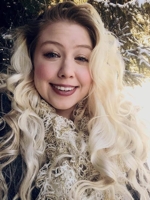
What Had Killed Her
by Sydney Doyle
Sydney was raised among the pines near the upper Delaware watershed but has since migrated, with the blue crabs and the blue herons, to the Jones Falls watershed in the Chesapeake Bay area.

I saw the sheen of the vulture’s black wing
before the smell of something dead
filled the car.
The bird’s hunchbacked, half-heart body bent
into the neighbor’s cat: a fat Calico
whose green eyes I’d often catch lit in headlight,
before she’d turn her pointed head.
I thought of the two children
she waited for the school bus with.
Their hands wriggled after her
black tail snaking into hyacinth.
I’d sped down this road countless times
before. I’d once seen the cat,
with a chipmunk in her mouth.
But a certain kind of creature eats the dead, like this:
white talons dipped into a ribbon of innards,
black beak cut into fur, picking at the long expired.
The yellow vulture-eye pinned
on something beyond the body.
I honked the horn,
though the cat was already dead
and gone with the taillights
of what had killed her.
© Sydney Doyle